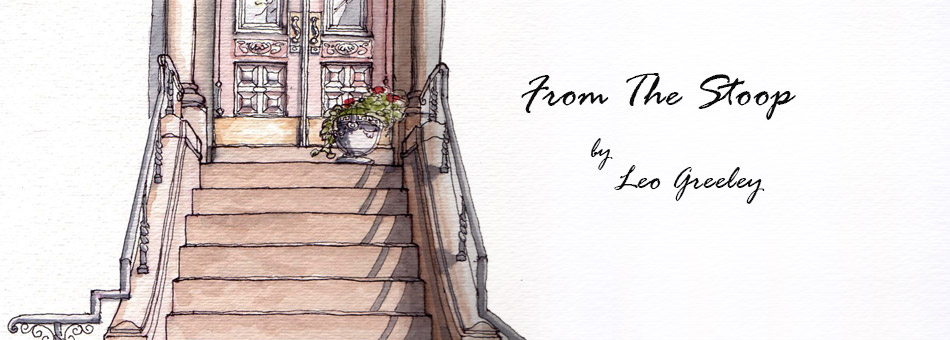From the Stoop – Nov 2015
The benefit of my new stoop is that I get to witness many generations passing by in such a short period of time. The grade school children travel the path next to my house on their way to school totally oblivious to what their future will hold. High school students pass by living for the moment but with an eye towards the near future. Once the children are safely on their way parents leave in their cars to jobs and careers that shape both their lives as well as the lives of those around them. Lastly a smaller wave of people who have already done what all the other groups have done pass by as couples or friends.
What interests me most is what happens next. If any one of the people who normally pass by, greet or not greet, were to be missing from one day forward how would I miss them. What legacy have they created? Do you build a legacy from the day you are born or do you embellish your legacy once you have reached a level of importance?
I watched with a barrage of mixed emotions when Max Keeping recently passed and I understood why I was feeling the way I did. I knew Max personally, my wife worked with him and I knew some of the stories behind the man. Max’s legacy is huge. It will take a very long time for the stories of Max and his cause to fade. Max is not the norm however.
What of the person who has a predictable simple life. What legacy does he or she leave behind and how long lasting? You go through the stages I see passing by each morning then once you are gone it will more than likely only be the living generation that will remember you. You will have no impact other than having instilled your philosophy of life onto a generation that will at least pass some of that forward. It begs the question, how can I make my legacy longer lasting or more important.
By one definition in the dictionary a legacy is a gift of personal property, as money. My parents left me no financial fortune. They valued self-reliance. I have seen too many people who value their well-endowed pocket book and inheritance more than their self-worth and pride of accomplishment. Heirs can float through life with a sense of entitlement, lifted by the wealth of ancestors, destroying the possibility of being successful on their own merits. While it is noble, and one may even say responsible, to leave behind financial security for one’s heirs, if they are not being taught how to fish for themselves, what may seem like a fortunate inheritance could become a disease of human malfunction. Given money and no lessons on self-reliance or self-accomplishment robs children of their own volition and choices. It is possible to honor the accomplishments one’s ancestor’s-and grateful for them-without being defined or defeated by them?
Perhaps ethical choices, moralistic lifestyle, sustainable ecological living, charitable work, compassion to humanity, scientific discoveries and artistic creations (music, paintings, literature, and so forth). What they all share is that legacy constitutes one’s character and good (or bad) deeds. It is important to note, it is not what one acquires but what one creates. I like to think of a legacy as encouraging the next generation, through one’s choices and actions, to identify and work towards realizing their own accomplishments and greatness.
I think the most valuable legacy any individual can leave is to make a change that can never be reversed. For lack of a term let’s call it karma. For an artist, it is his or her art; for a writer, it is the words; for a musician, it is music; for an entrepreneur, it is an invention of business; for a gardener, it is a beautiful landscape; for a chef, it is new recipes…yet, for a parent, you naturally think it is the child. Yet as a child you have free will and you have the ability to choose which part of your parent’s legacy to carry forward or to leave behind. The legacy you instill into your child will only partly be carried forward or incorporated into their own legacy.
A legacy should be deeply considered. It takes on immortality, and it is how we live on after death. If we think of our legacy as a gift, it places an emphasis on the thoughtful, meaningful, and intentional aspects of legacy. The consequences of what we do now will outlive us.
My Faith tells me that what we do is a summation of what my ancestors have accomplished added to what I can lay claim to in my lifetime. Any ceremony I conduct or am in participation in always has an invitation to my ancestors to also attend. I can feel their presence and I know my values in life either adds to their own legacies of corrects what may have been done wrong in past lives. I also know my descendants are attune to the voices of those that allowed them to be who they are so perhaps my voice will be heard long after I am not a living being.
Is this my legacy?
